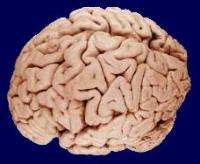Early scents really do get 'etched' in the brain

Common experience tells us that particular scents of childhood can leave quite an impression, for better or for worse. Now, researchers reporting the results of a brain imaging study online on November 5th in Current Biology show that first scents really do enjoy a "privileged" status in the brain.
"We found that the first pairing or association between an object and a smell had a distinct signature in the brain," even in adults, said Yaara Yeshurun of the Weizmann Institute of Science in Israel. "This 'etching' of initial odor memories in the brain was equal for good and bad smells, yet was unique to odor." Sounds did not have the same effect, the research showed.
In the study, the researchers presented adults with a visual object together with one, and later with a second, set of pleasant and unpleasant odors and sounds while their brains were imaged by functional magnetic resonance imaging (fMRI). A week later, the researchers presented the same objects inside the fMRI and tested participants' associations of those images with the scents and smells.
The researchers found that people remembered early associations more clearly when they were unpleasant, regardless of whether they were smelled or heard. The images, however, revealed a unique activation in particular brain regions in the case of their first olfactory (but not auditory) associations. That signature held regardless of whether the odors or sounds were pleasant or unpleasant. The researchers even found that they could predict what a person would remember later based on the activity in their brains on day 1.
Yeshurun explained that it makes good sense to remember unpleasant memories as a kind of evolutionary "risk management." But the findings show that there is also something particularly special about early memories of smells.
That wasn't really unexpected, Yeshurun said—it is after all a phenomenon that has long fascinated authors, poets, and scientists alike. Still, the results did hold some surprises.
"We expected a unique representation of initial or 'first' olfactory associations but did not expect that it would materialize even in cases where the behavioral evidence did not indicate a stronger memory," Yeshurun said. "In our paradigm, initial and later olfactory associations were remembered equally well, but only first associations had the unique brain representation."
In terms of understanding the brain, the findings suggest that activity in two brain regions, known as the hippocampus and amygdala, together can render a memory "special."
Although any application of the findings would be far off, Yeshurun said the results could suggest ways to strengthen particular memories. "Perhaps more importantly, it may help us generate methods to better forget early and powerful memories, such as trauma," she said.
Source: Cell Press (news : web)













